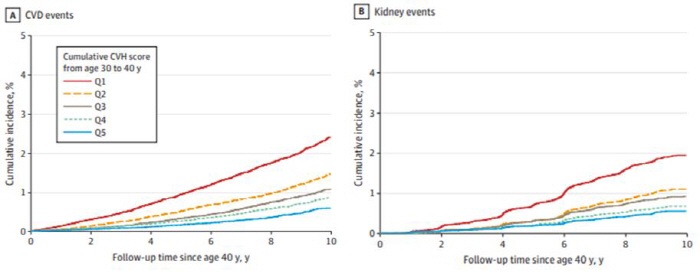Cardiovascular management in youth and cardio-cerebrovascular and kidney disease risk up to 75% lower after middle age
Oct 24, 2025
|
A research team led by Professor Lee Ho-kyu, Professor Ha Kyung-hwa of Yonsei University Medical School, and Professor Ji Jong-hyun of the Department of Renal Medicine at Gangnam Severance Hospital announced on the 24th that if cardiovascular health is consistently maintained at a high level in their 30s, the risk of cardiovascular disease or kidney disease after middle age can be reduced by up to 70%.
The findings were published in the international journal `JAMA Cardiology, IF 14.1)" of the Journal of the American Medical Association.
Cardio-cerebrovascular diseases such as myocardial infarction and stroke and chronic kidney disease have common risk factors such as high blood pressure, diabetes, and dyslipidemia. These risk factors accumulate from young adulthood and lead to disease development after middle age. Therefore, it is important to comprehensively evaluate and manage risk factors at an early stage for long-term disease prevention.
Until now, studies have shown that cardiovascular health can be prevented when the level of cardiovascular health is maintained above a certain standard, but most have focused only on post-midlife health conditions. The long-term effects of young cardiovascular health on disease development after middle age have not been sufficiently elucidated, and it was difficult to determine the effects of long-term accumulated cardiovascular health status by evaluating only short-term cardiovascular health.
The research team analyzed the association between cardiovascular health scores and the risk of cardio-cerebrovascular disease and kidney disease in 240,194 30-year-old adults who participated in the national health examination from 2002 to 2004 using big data from the National Health Insurance. Cardiovascular health scores were evaluated at each examination point based on six items: physical activity, smoking, body mass index, blood pressure, blood sugar, and blood lipids, and these were combined to obtain cumulative scores for 10 years from age 30 to age 40 and classify them into quintiles. After that, an average of 9.2 years of follow-up was conducted.
As a result of the analysis, the annual incidence of cardiovascular disease and kidney disease in the group (Q5) with the top 20% cardiovascular health level was only 0.05%, and the risk of cardiovascular disease was 73% lower and the risk of kidney disease was 75% lower compared to the group (Q1) with the bottom 20% cardiovascular health level. In particular, the cumulative effect was more pronounced as cardiovascular health was maintained at a higher level and for a longer period of time.
Professor Lee Ho-gyu said, "Through this study, we comprehensively assess the level of cardiovascular health in young adulthood and follow it up for a long time to investigate the cumulative effect of the formation and persistence of health habits and factors on future disease prevention."In establishing strategies for preventing cardiovascular disease throughout life, a transition to comprehensive health care throughout the life cycle beyond treatment in old age or old age will be necessary" he said."
|
This article was translated by Naver AI translator.















